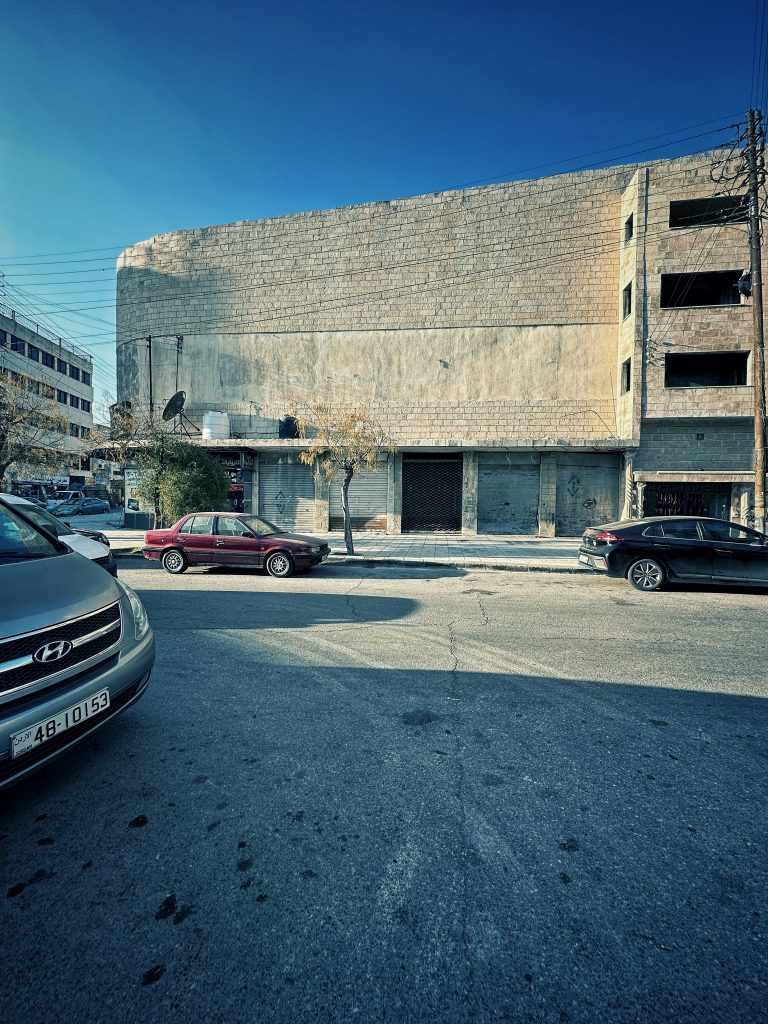
Jabal al-Hussein walk and talk. Episode 6.
How many ghosts of yourself have you left lingering in this city? Can you remember where you left them?
—
Khaled bin Alwaleed street started ascending up the hill. And with it my memories started rising. We arrived at a place of urban magic. Or, at least, I see it this way. No one else seems to care.
I found three of my ghosts lingering there.
—
As we ascended up the street, we arrived at the triangular block formed by the main street (Khaled bin Alwaleed), Qibia Street and Nahhalin Street. Nahhalin and Qibia are names of Palestinian villages. So many of Jabal al Hussein’s streets are named after Palestinian villages and cities. The district seems like a little Palestine. It’s an intriguing urban decision which I never understood or asked about.
There is a magical mix that makes this block and its surroundings a piece of Amman that I find unique and, somehow, beautiful, although it is neither grand nor recognized as important by anyone I know. The way the streets intersect, their widths, the sidewalks, the varying heights of the buildings and their functions, the way the sun falls. I can’t quite explain the magic.
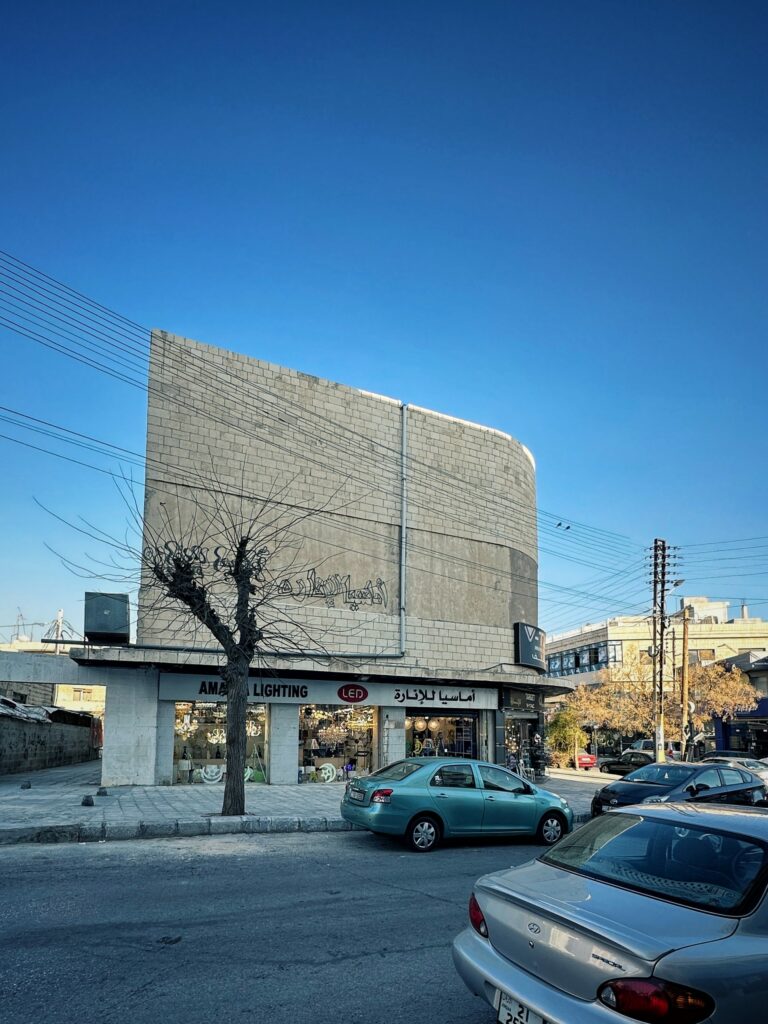
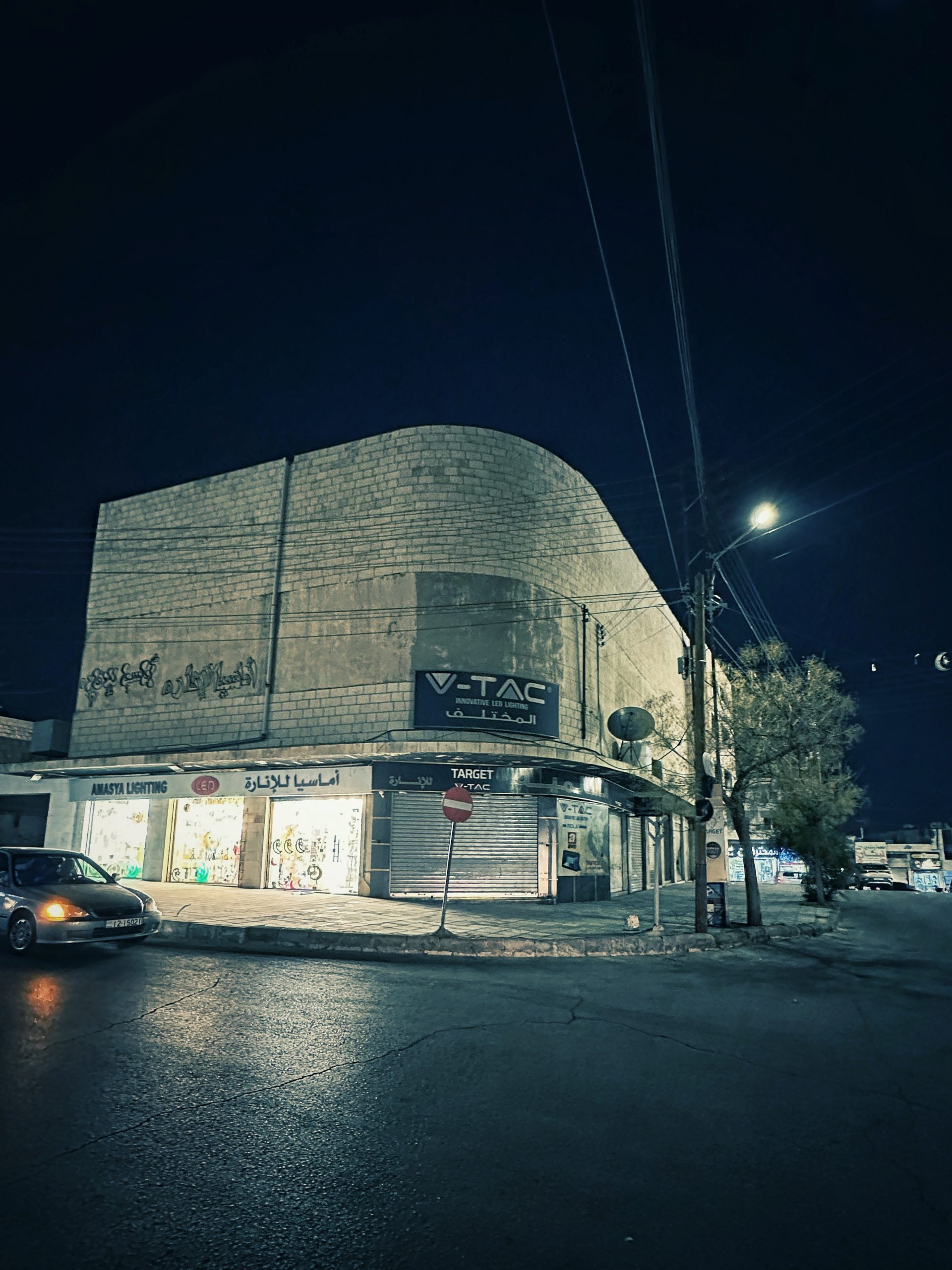
At the eastern base of this triangular block stands a building which gives this place a unique character. It’s the Opera House Theater (formerly Al-Quds “Jerusalem” Cinema). It’s a simple modernist structure with curving corners and a sloped roof. The theater dominates the intersection with its solid yet dynamic presence. The ground floor is comprised of shop, only one of which is open (selling electric lights). I imagine the scene from a time this movie theatre was open. What were these shops selling? Snacks? Magazines? Did people linger after a movie on the generous sidewalk? How many of them lived within walking distance of the theatre? Am I imagining some mythical time of hope and progress, in a version of Amman forgotten before it can be remembered?
Inside the theater my first ghost lives.
He’s 19. He’s been dwelling in the theater since 1989.
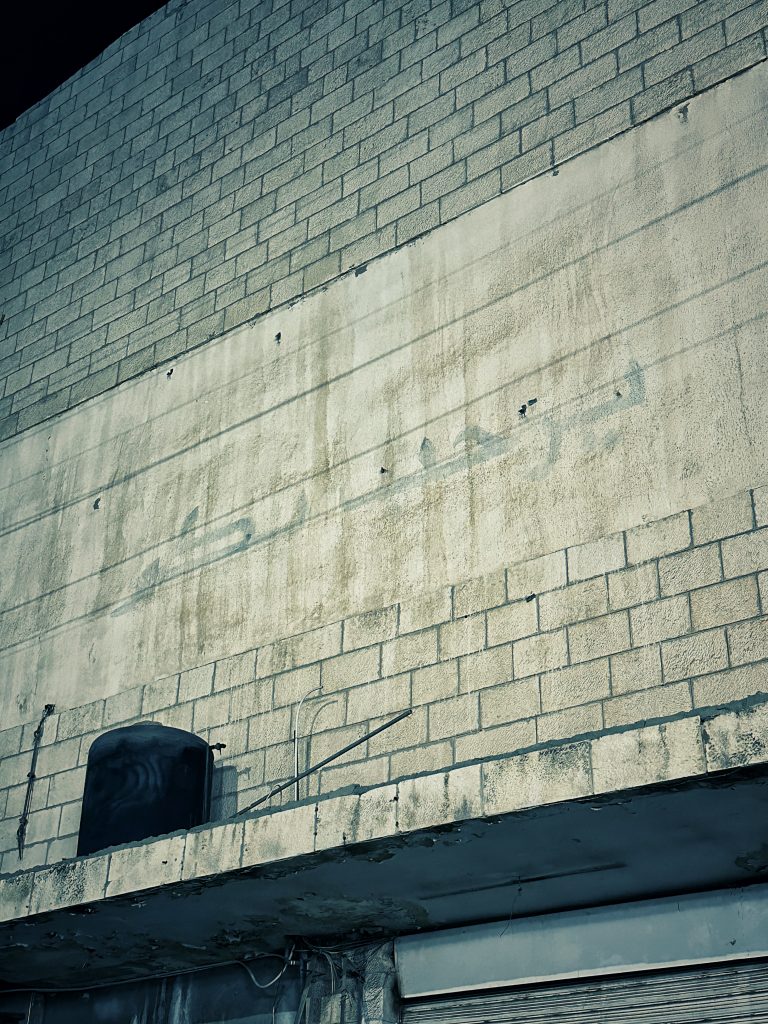
—
In 1989 just as my friends and I were entering adulthood, unrest broke out all over Jordan. What started out as a protest over fuel prices, escalated into a widespread uprising with a variety of political demands. This was at a time when Jordan was ruled by emergency law, curtailing freedom of expression and gathering as well as political affiliation. The late King Hussein decided that the best way to diffuse this situation was to revoke emergency rule and provide a democratic opening for the country. Overnight we, teenagers, found ourselves living in a totally different country.
As we grew up, the names of political parties could only be whispered. They were literally illegal.
Then everything changed.
Suddenly I’d open the newspaper and see statements by communist, leftist, Arab nationalist and Islamist party leaders. Out of the blue we found ourselves as potential voters in what was promised to be a free parliamentary election.
As the election drew closer we started hearing about debates between candidates. One evening we found ourselves excitedly heading towards the Al-Quds Cinema Theater for a hot debate between Laith Shbeilat the charismatic outspoken opposition figure and a more docile Ali Abu Al-Ragheb. It was a full house. All of this was so incredibly novel and exhilarating. People speaking freely. The candidates dueling on stage. Clapping. Cheering. We no longer needed to fear the secret police. Or so we thought. Shbeilat emphatically won the debate that night hands.
—
I could not find anything on the internet about that debate.
I also could not find anything about the theater itself on the internet. The only information about it concerns the fire that burned the entire building in 2016. I couldn’t find anyone writing about a memory of watching a movie there in the 1970s or 1980s. No information about who built it (only a questionable line in a business directory claiming it was built in 1976).
Today the theater just stands there, burned out, sad, unused. Before it burned someone thought it would be a good idea to deface its modernity by adding stupid stone columns to its facade that faces the main street. The historian and architect Rami Daher has talked often about the loss of the “heritage of modernity” in Amman. Cinema theaters are an important part of the modernist era of Amman. They functioned as new places of social gathering beyond the mosque, church, school or market. Some of Amman’s old cinemas have received some academic and press attention. But not not the Opera House in Jabal al Hussein. As far as the internet is concerned, it never existed.
Then it burned.
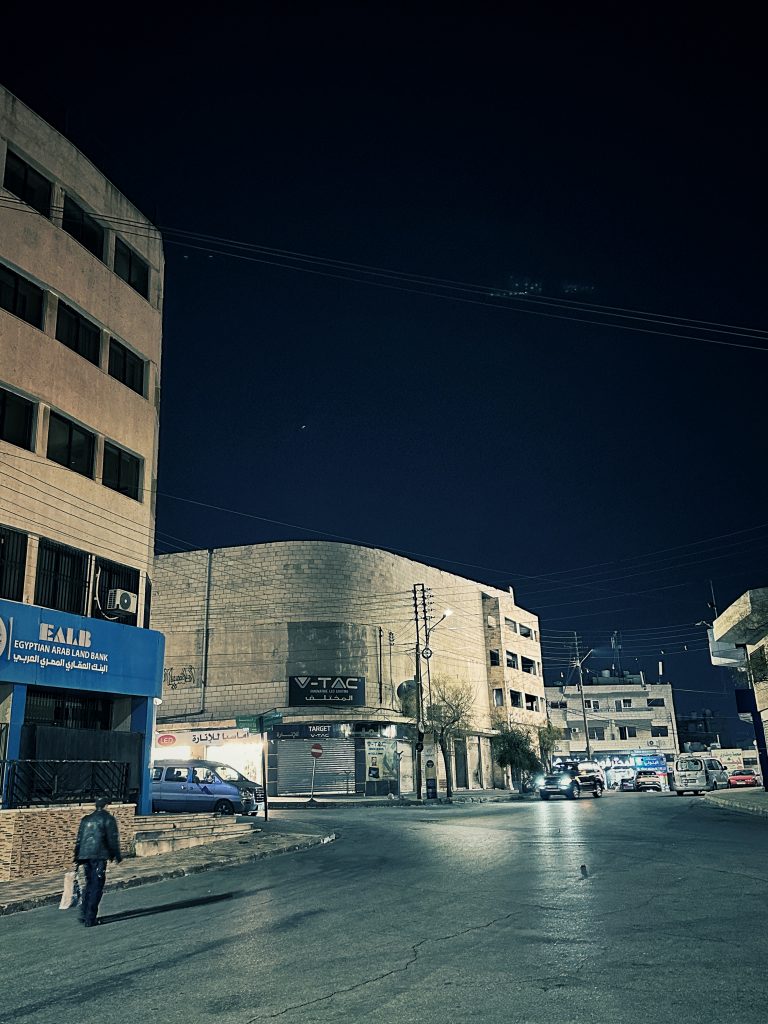
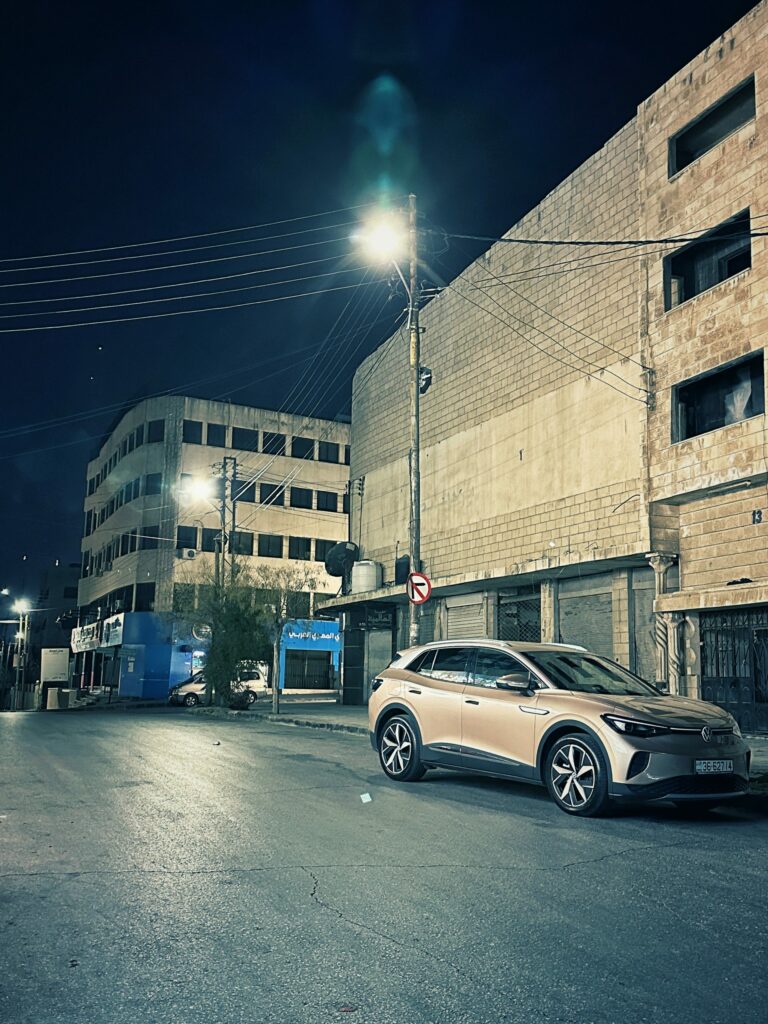
—
Opposite to the theater is a a rather nondescript multi-story commercial building. Another ghost of mine sleeps there. He’s been there since around 1992.
By 1992 I was a graphic designer working under the name Alpha Design. With money lent to me by my mother, I bought my first Macintosh. Officially, I was a student of architecture in the University of Jordan, but I was well on way to having a design career.
Around 1992 I found myself working on a freelance job subcontracted to me by an older designer. The job was to design a prestigious brochure for the Scientific and Medical Supplies Co (SMS) one of the companies owned by the influential Mousasher family. The designer shared an office on the upper floor of the commercial building opposite the theater, and the work on the brochure was to be done there. The office’s main tenant was friendly but somewhat peculiar American man, who ran a graphic design business in Amman under the name Jasmine Graphics, one of the few such businesses in Amman.
The job itself was extremely educational. Part of it involved being on a photo shoot with the late Amman-based American photographer Bill Lyons. That was the first time I’ve worked with a professional photographer. At the time, Bill Lyons, Osman Akuz and maybe another couple of people where the only professional commercial photographers in Jordan. Working with one of them seemed like working with a god.
One of the shoots was inside an amazing old modernist building in Jabal al Hussein, the now demolished Mouasher Hospital. The hospital was renovated and was supposed to be reopened, complete with sophisticated medical devices supplied by SMS. Bill, with his serious professional demeanor punctuated with his dry sense of humor, sprinkled with some Arabic words, was busy illuminating shots of the hospital’s high tech equipment with professional lights covered by colored gels. I’ve never seen these used before. He was doing test shots with Polaroids! This was all before digital. It was photographic magic. And I got to watch, awe-struck.
One night I was doing layout work on the SMS brochure, racing to make the deadline. Then, as now, I wasn’t a good time manager. The American man had given me keys to the office, so I could come and go whenever I wanted. The hour got so late I couldn’t have gotten any transport home. So I decided to sleep on the office floor. That night, all alone in the entire building, I was looking for paper or office supplies and my eyes fell on some papers with very strange christian prayers on them. I realized at that moment that the American owner of the office was involved in christian evangelizing activities.
Converting Muslims to christianity was (and still is) illegal in Jordan and closely monitored by the security authorities of the country. I remember feeling somewhat scared to be in the office all alone in the middle of the night. What if this place was being watched?
Eventually, I finished the brochure. I never set foot in that office again. But every time I pass that building I remember my 22 year old ghost who’s sleeping there on the floor that strange night
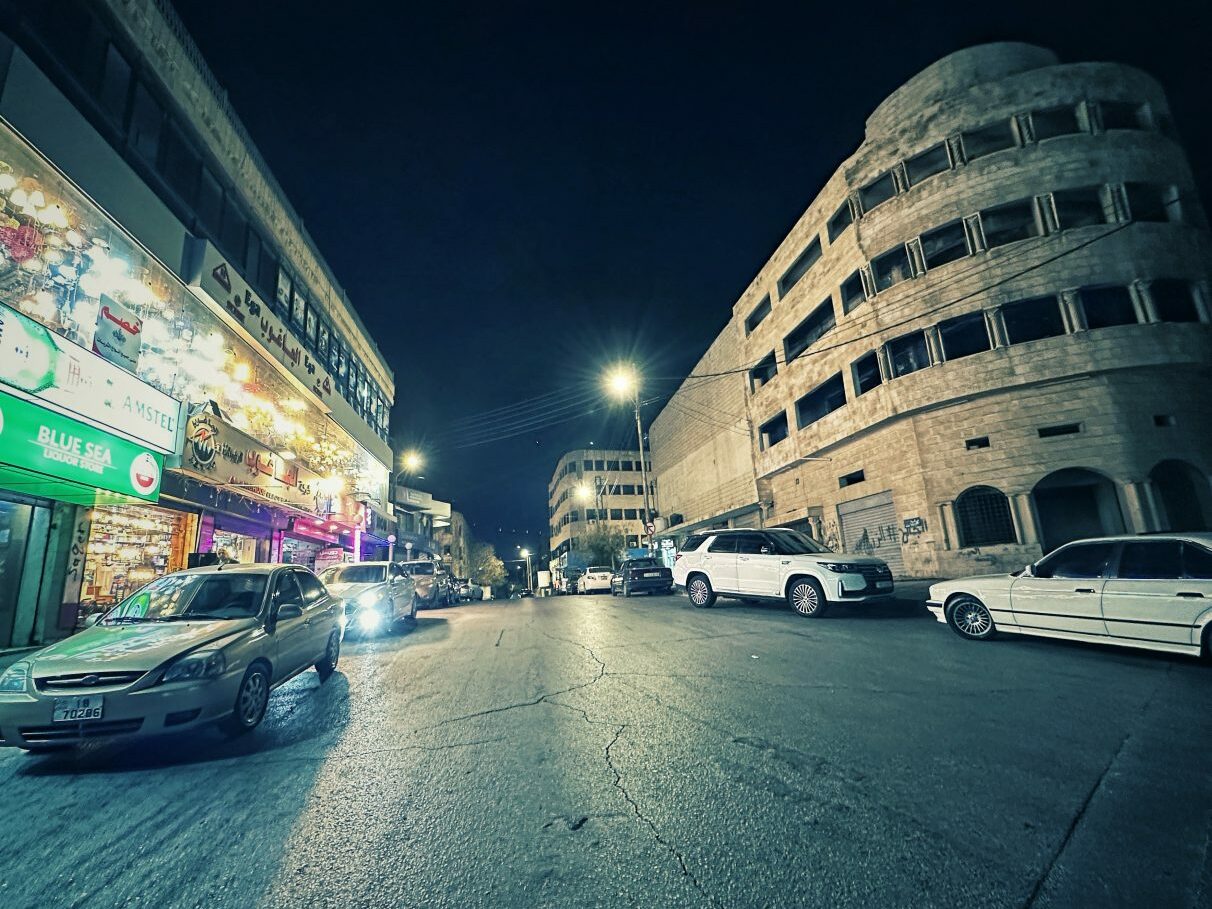
—
The magic of that urban triangle would not be complete without the story of Rex Supermarket.
Facing the other side of the theater on Qibia Street once stood Rex Supermarket. The store was owned by Zahi Arafat. One of Rex’s claims to fame was that the municipal authorities once threatened to close it when when one of its inspectors “discovered” that the store was selling “moldy cheese” (a.k.a. blue cheese!). How do you explain to an inspector that this is a European delicacy!
I got to know Uncle Zahi through his son, Mazen. He too is someone I met around 1992, through a design job. We were introduced by a common friend whom I knew from university, Yazan Samara, who was working at the time with Mazen in a company called The Project Development Group (PDG). They worked out of an office in the Bakri building that overlooks the 3rd Circle in Jabal Amman. I was asked to design their logo and brochure. Mazen quickly became my “interesting friend”. I mean how many people would do you meet in Amman who had a Japanese mother? But more than an interesting friend, Mazen soon became a lifelong friend.
His father Zahi was this amazing mixture of Palestinian Nabulsi-ness and open worldliness, always mixing English words into his speech, with a characteristic dose of good natured humor. Jabal Amman might have had its Khalaf Supermarket (the first store to introduce supermarket trolleys in Amman), but the king of Jabal al Hussein’s modern grocery (and, apparently blue cheese) was uncle Zahi Arafat and his Rex.
The internet has forgotten about Rex. It closed many years ago. But it lives on through Foron Rex, Amman’s current king of artisanal bakeries, run by Mazen’s younger brother Kareem.
Long forgotten and replaced by several stores selling various wares, Rex is still there in my mind overlooking the theatre. A third ghost of mine is lost wandering the building since the mid 1990’s when Mazen was trying to get me involved in a modernization of the building and the business, that never happened.
—
In the 2000s I got to know Laith Shbeilat personally, through business not politics. I did some branding work for businesses he was involved in. He passed away in 2022. The same year we also laid uncle Zahi to rest.
This post is dedicated to the memory of Zahi Arafat
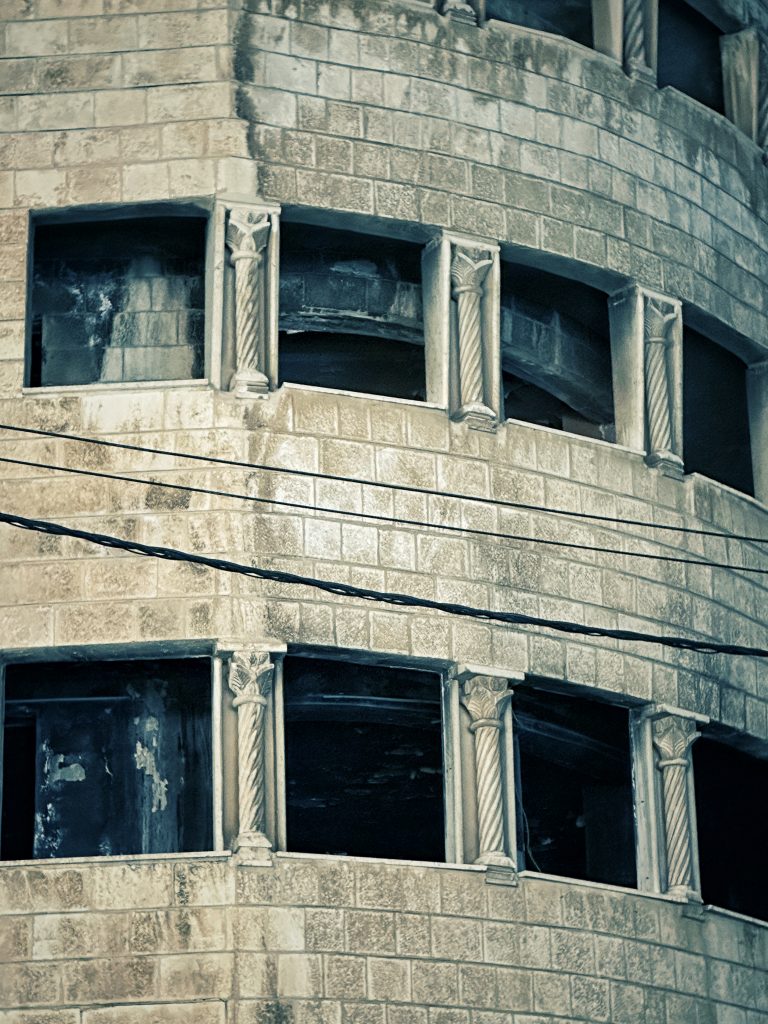
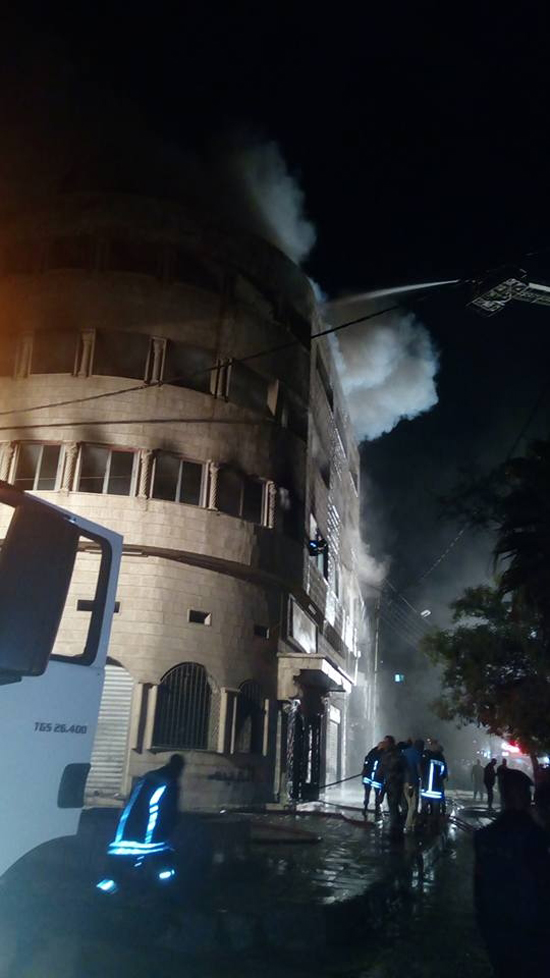
Leave a Reply